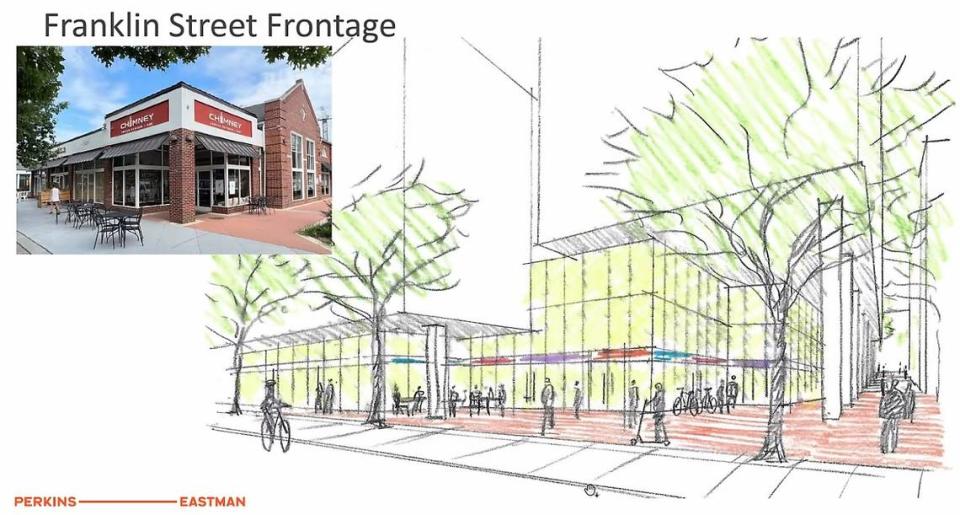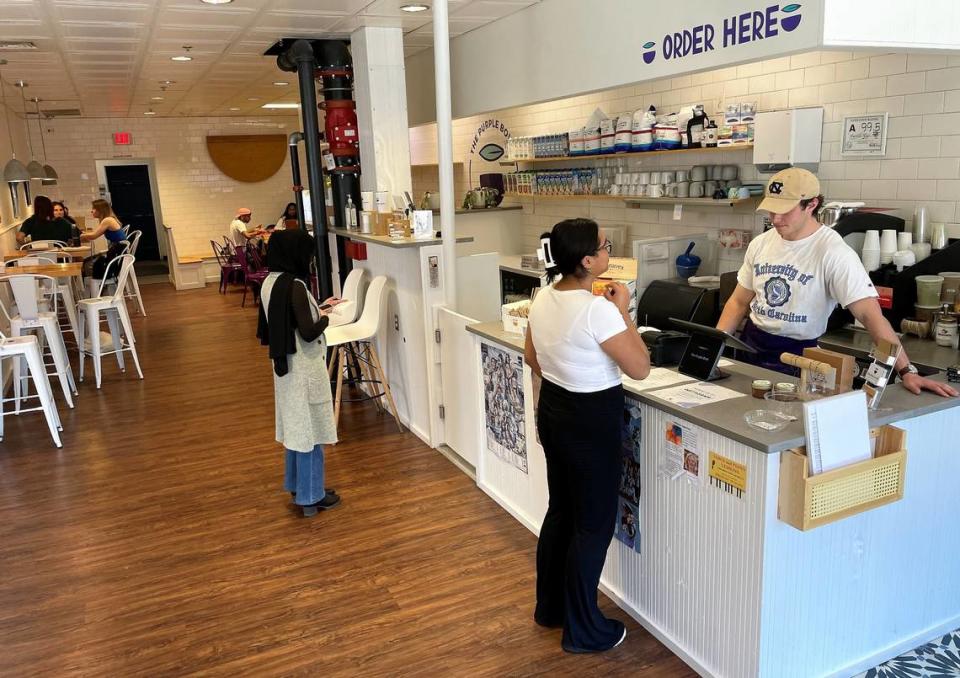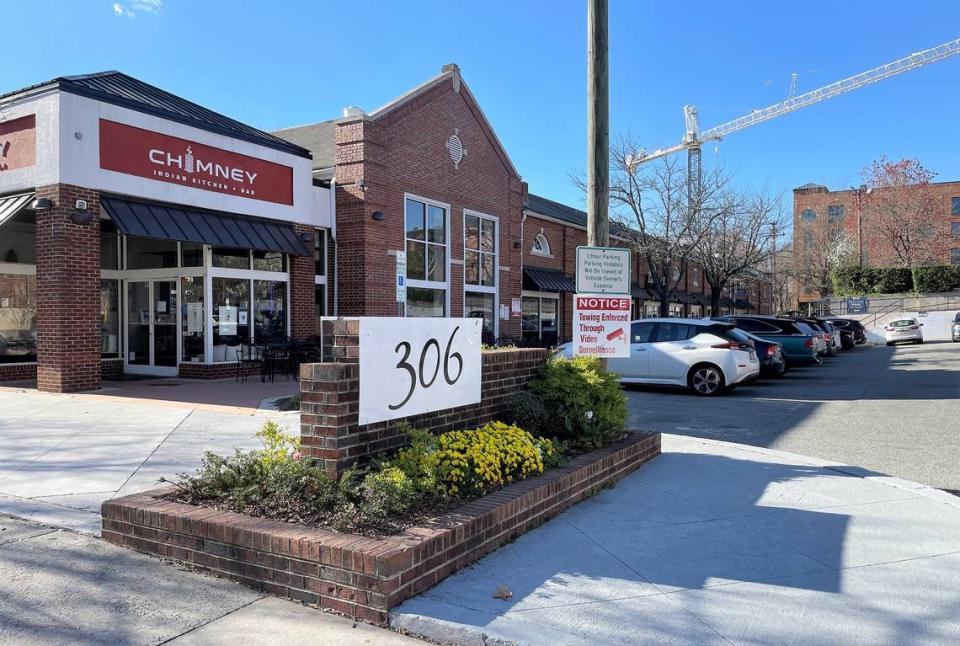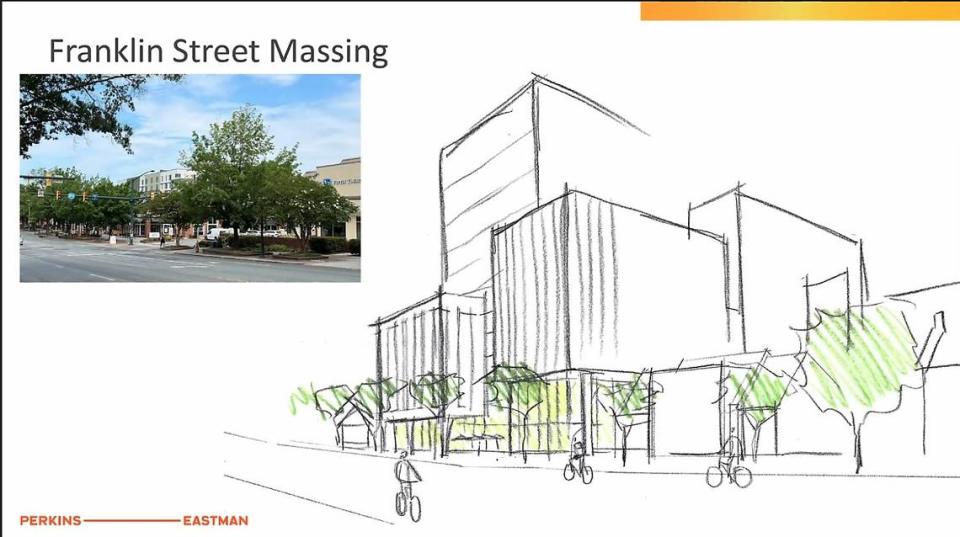Chapel Hill council wants development on Franklin Street, but shares public concerns
Chapel Hill’s council heard plans Wednesday for the type of project that they’ve been courting for years, but they also heard from a room packed with residents, UNC students and business owners who said it’s not the right fit or the right location.
A Chapel Hill Life Sciences Center concept plan proposed by Boston-based developer Longfellow Real Estate Partners would add roughly 320,000 square feet of laboratory, office and retail space to 1.84 acres between West Franklin and West Rosemary streets, displacing the Purple Bowl restaurant and other small businesses at 306 W. Franklin St.
The building would have frontages on both streets and sit at the lowest elevation on Franklin Street. It would reach 150 to 160 feet in height, including a roughly 20-foot-tall mechanical penthouse serving the laboratory spaces, making it the tallest building downtown.
The project could be served by a 320-space parking deck off West Rosemary Street and wrap around Fifth Third Bank. The developer is talking with the Bicycle Chain on West Franklin Street about buying its land and expanding the project site.
The concept plan is not an official application, but a rough sketch that allows the developer to seek feedback from the Town Council and the town’s Community Design Commission. The next step could be an official application, which could eventually come to a vote.

The council doesn’t reach decisions lightly, Council member Jessica Anderson told the crowd after listening to their concerns. The proposed project is “a reasonable use” for downtown, and the reality is the existing building will be redeveloped, she said. It’s the town’s responsibility to find a solution for the whole community.
“I think that we should have some really good conversations about what the future can look like,” Anderson said. “Can there be another amazing space downtown? There’s a lot, unfortunately, there are other places downtown. Will they make sense? Will they be as beautiful and sunny? I don’t know ... but I know there are already other people saying they want Purple Bowl in their space.”
The proposed project would replace a 1 1/2-story building constructed in 1948. The developer is asking the council to rezone the site to Town Center-3, which allows a 44-foot building near the street and up to 120 feet at the site’s core. Planning manager Corey Liles said that could create a new zoning district.
Other key issues include traffic, parking and stormwater, since the site is prone to flooding. Council members offered other suggestions for how to make the project better, including:
Amy Ryan: Consider reducing the building’s size or its visual appearance, and avoid creating a canyon-like feeling in the Franklin-to-Rosemary walkway. Make public space better than existing spaces at 140 West or Carolina Square.
Michael Parker: More parking under the building or in town parking decks, rather than in a deck on Rosemary Street. Add stores that encourage people to use outdoor spaces, and also allow for musicians and other activities. Consider a building that blends modern glass and steel with the town’s historic red brick, similar to newer buildings on UNC’s campus.
Adam Searing: Look to UNC’s planned Porthole Alley redevelopment on East Franklin Street, where public pressure caused the university to revise the plan so it preserves the 101-year-old Carolina Coffee Shop building.
Pam Hemminger: Follow the AC Hotel’s lead in engaging with the Northside and downtown community, and ensure good lighting to keep the public walkways safe for pedestrians at night. Encourage employees to rely on transit instead of parking downtown.

Support for Purple Bowl, small businesses
The Gillands, a local family that owns the Purple Bowl, have rallied thousands of customers, employees and friends to help save their business, with months of emails to the mayor and Town Council and comments at public reviews.
Taylor Gilland told The News & Observer in an interview last year that he and his parents knew the landlord wanted to sell, and they offered to buy the building while completing a $500,000 expansion into the adjacent space.
They also were talking with investors about adding a beer garden and 10,000-square-foot rooftop deck, said Gilland, who co-founded the business with his parents in 2017 and is chairman of Purple Bowl LLC.
Paula Gilland, who is Purple Bowl LLC’s chief executive officer, spoke Wednesday with her husband beside her. She questioned the need for more wet lab space downtown with one building leasing, another on the way, and no indication that more demand is there.
Community spaces like Purple Bowl are “treasures but also incredibly fragile,” Gilland said, noting that the town is at the tipping point of replacing its “local charm with the institutional blandness of the Streets of Southpoint.”
“If we have large buildings sitting largely unoccupied, not only has the town and its population of citizens and students undergone trauma of a long construction project for nothing, but the empty building sitting right on Franklin Street will serve as on a blight on downtown,” Gilland said.
UNC students, customers and Purple Bowl employees also spoke, telling the council how Gilland welcomed them, took interest in their lives, and gave them a second home at the restaurant.
Her daughter was born with Down’s Syndrome, Maria Romano said, but unlike most people with intellectual and developmental disabilities, she and five others found purpose at Purple Bowl. They are also helping customers and co-workers learn about inclusion in the workplace, she said.
Gilland hired her “on the spot” in September 2019, Lucia Romano said, because “she believed I could do more.” She loves taking orders from customers and “being part of this family and part of this community,” she said.
“I love working at Purple Bowl, because it makes me feel happy, appreciated and respected,” Lucia Romano said.
UNC Student Body President Teddy Vann said she supports Purple Bowl, but also is concerned about losing the history of the building and West Franklin Street, which was home to Black-owned businesses and businesses catering to Black people before integration.
“For me, that community is something that’s been so important, that’s been so critical to my experience as a Black student here and being able to connect with our mentors, and I think about the history of gentrification in our country, but also Chapel Hill specifically, and have some major concerns about what the creation of this space would mean for the Northside community,” Vann said.

Town looks at relocation help
The town is looking for solutions, and at the possibility of a fund to help small businesses with relocation costs, Mayor Pam Hemminger said. The sites they’ve identified so far for Purple Bowl — in Grubb Properties’ proposed apartment building at East Rosemary and North Columbia, and in the former Benny Cappella’s pizza shop at 122 E. Franklin St. — weren’t good fits, Gilland said.
Longfellow officials suggested they close and reopen in the new building, which could take a few years, hurting the business and costing her 64 employees their jobs, Gilland said.
Longfellow Managing Director Greg Capps was sick and unable to attend Wednesday’s meeting, his team said, leaving them unable to answer questions about community engagement or future tenants.
UNC student Flavia Nunez read a statement from Tina Ngo, owner of the Bella Nail Bar, who had to care for family and couldn’t attend.
The Vietnamese-owned salon underwent an expensive remodel of its space at 306 W. Franklin St. in 2020, leaving her without money to start over, Ngo said, and the developer’s offer to relocate her to Durham was too far for her customers and her 12 employees. Her lease ends in May, she told The News & Observer by phone Thursday, declining further comment.
Council member Tai Huynh, who parents were Vietnamese refugees, said he talked with Ngo and questions the veracity of some statements that she heard from the developer. He saw the Durham relocation offer as “a blatant slap in face,” he said.
“As much as I want to see this investment, I can’t support this unless we do right by all of the current tenants in that space,” Huynh said.
In a statement last month to The N&O, spokesman Casey Angel said Longfellow “has not suggested to anyone to close their business.”
“Our team is looking forward to working with all of our partners and customers on timing and flexibility that ensures their success and the success of downtown Chapel Hill as a whole,” Angel said.

Economic development goals
The town’s economic development strategy for over a decade has been trying to build office space to attract established businesses and startups spinning out of UNC’s research and innovation labs, many of whom end up moving to Durham and Research Triangle Park. Those companies want to be in a vibrant, idea-fueled climate like UNC offers, not on the periphery of the town, officials have said.
The goal is a year-round business and residential district that works even when UNC students leave town, Hemminger said.
Among several tech companies landed so far is Well Dot Inc., which signed a 10-year lease for two county-owned buildings on West Franklin Street in September. The company chose Chapel Hill over Boston when it opened in 2019 at 419 W. Franklin St. with a $3.1 million investment and plans to hire a few hundred employees.
Town leaders also celebrated in 2021 and again this year when partnerships with UNC were announced to create a downtown Innovation Hub and an Innovation District to boost the town’s economic development strategy.
Grubb Properties is planning or leasing more apartments, offices and research spaces on East Franklin and East Rosemary streets, just a block from UNC’s campus, including at the Innovation Hub, which resulted from an extensive renovation of the former CVS building at 136 E. Franklin St. and 137 E. Rosemary St.
The next step for Grubb Properties is replacing the Wallace Parking Deck on East Rosemary Street with a new, 240,000-square-foot wet lab and office building, which could be up to 132 feet tall.
Every job added injects roughly $4,000 a year in customer spending into the downtown economy, Council member Amy Ryan noted.
“One of the things that our small businesses struggle with downtown especially is we know (students) are great customers, but you leave us in summer, and it’s really hard for our businesses to make it through that time when they have so few people in town,” she said.

 Yahoo Movies
Yahoo Movies 
